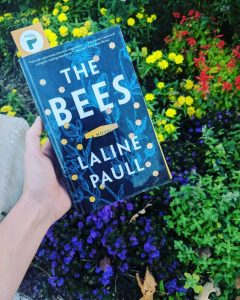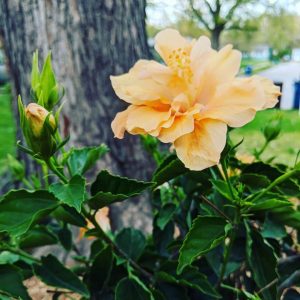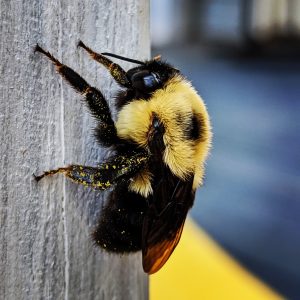The factors that give a book that coveted position on our “favorites of all time” list are as varied as we are. Me, I have categories. A spectrum, ratings. They’re all cataloged very carefully in my mind, ready to spring to my lips when speaking with patrons or fellow bibliophiles when their subject or appeal is brought up. There are a very select few that form a circle in the Venn diagram of the reasons my favorites are my favorites. They are the ones that took me on an unforgettable journey, made me laugh, tugged at my heartstrings, challenged me intellectually, and ignited or elevated a passion.
Last year, The Bees by Laline Paull edged into that elite status, although it took until recently to recognize this, as the criteria of staying power must be considered...am I thinking about the book months later? Wondering what might happen after the story ended, turning bits of prose and dialogue over in my mind?
“You have wings and courage and a brain. Do not annoy me by asking permission." - Lily 500
Why yes, yes I am.
A work of dramatic, adventurous science fiction, The Bees was a perfect selection for my speculative fiction book club. In hindsight, it’s painful for me to admit that without my book club, I probably wouldn’t have given this book the second look it so richly deserves. I wrote about this happy side effect of belonging to a group of diverse readers in another blog post.
 Flora 717 is a lowly worker bee in a busy orchard hive. The book follows her from the time of her hatching and through her complete lifecycle. She’s different from her sisters in the hive, loyal but curious, vulnerable but strong, obedient but moral. In her short time in this world (approximately 150 days for the average honeybee), she works her way through a complex caste system, changes careers, has many foraging adventures, breaks ALL the rules, stands up to tyranny. Her heroic tale blends a transportive narrative with fascinating lessons in the biology of the bee, their social hierarchy, hive mind, etc.
Flora 717 is a lowly worker bee in a busy orchard hive. The book follows her from the time of her hatching and through her complete lifecycle. She’s different from her sisters in the hive, loyal but curious, vulnerable but strong, obedient but moral. In her short time in this world (approximately 150 days for the average honeybee), she works her way through a complex caste system, changes careers, has many foraging adventures, breaks ALL the rules, stands up to tyranny. Her heroic tale blends a transportive narrative with fascinating lessons in the biology of the bee, their social hierarchy, hive mind, etc.
Parallels have been drawn to Watership Down, one of the most famous animal protagonist novels, but to me The Bees is singular. In the way it appeals to our human emotions and empathy, but leaves us with no doubt that it’s exploring an animal kingdom we will never fully understand. The way it taught me so many things about honeybees, factoids from science class that didn’t stick until I learned them through the power of story. The way it made me pay closer attention to environmental issues that lived in my periphery up until then.
Because I was aware of the plight of our pollinators before reading this book, but something about it motivated me to be more knowledgeable and intentional. Since then, I've also been inspired by a couple of my library coworkers doing amazing work in pollinator friendly gardening: Angela in accounts runs her own flower farm, and by Book Squad teammate Kaitlin has created a learning garden in Hobbs Park to educate folks on how native and wild plants benefit pollinators, and people.
This planting season I made conscious decisions about what non-wild flowering plants to landscape with, and was pleased to discover that many of my old favorites are on the pollinator friendly list: Lilacs, peonies, snapdragons, sunflowers, and to my extra immense delight, hibiscus. The main things to consider are do they produce nectar (obviously), and is the nectar easily accessible to the bees? Hibiscus is a perfect example of an aesthetic bee-friendly choice. It's brightly colored, fragrant, produces nectar and the petals open wide creating plenty of space for bees to work.
I also took the time to learn about something that has long piqued my curiosity. "Struggling" bees, or bees that you see resting somewhere for a prolonged period of time. I recently encountered a bumblebee in such a predicament on my back porch. She (I assume, because foraging bumblebees are most often female) sat (stood?) on the porch railing for most of a morning. The day was one of the chilly ones we've had recently, sprinkled into our otherwise flawless spring weather.
I wanted to help her, but I know that well-meaning humans often do more harm than good when it comes to wildlife. As evidenced by a viral fake news post (infuriatingly attributed to Sir David Attenborough) that advised people to leave out sugar water to "help" exhausted bees. This is a terrible idea for a number of reasons, chief among them the fact that sugar is as bad for bees as it is for us. In other words, it's empty carbohydrates with zero vitamins, unlike nectar and pollen. It also increases the risk of transferring deadly pathogens that could wipe out an entire colony. I learned that if you find a struggling bee, you should see if it's able to recuperate in an hour or so. If not, consider moving it carefully to a nearby flower so it has access to a food energy source.
But it's important to keep in mind that a bee in this state could just be at the end of their relatively short life, especially in the case of a worker honeybee that only lives for six weeks in the summertime. Which is sad, but a spoonful of sugar water won't help. You can sometimes tell by the physical condition of the bee how likely it is that they have embarked on their final forage. If they are elders, they may have a dull appearance and ragged wings. As you can see, "Fuzzy 717" appeared to be a young, healthy (not to mention gorgeous) specimen, and she did end up flying away after a rest.
I plan to revisit The Bees sometime this year, perhaps in the dog days of summer when my sunflowers are in full bloom and the bees are extra busy preparing their colonies for winter. It's a perfectly themed choice for this year's Summer Reading program, and is also available in our Book Club in a Bag collection, which will be available to check out again very soon. I encourage you to read it, and also to do as scientists unanimously agree is the best thing we can individually do for our pollinator populations: Plant more flowers!
Happy reading, and planting, and long live the bees.
-Leah Newton is a Readers' Services Assistant at Lawrence Public Library.




Add a comment to: Long Live the Bees